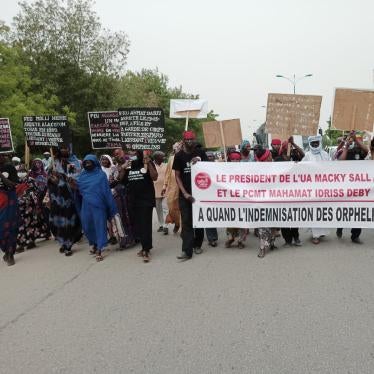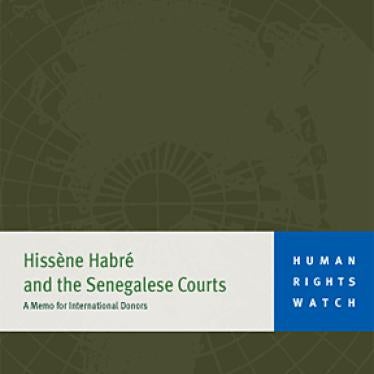BANJUL, Gambia (AP) - What does it take to bring a former dictator accused of killing thousands to justice? What's the statute of limitations on torture? And how much time do you have before people stop caring?
American human rights activist Reed Brody has spent the past seven years pushing for the trial of former Chadian President Hissene Habre, charged with overseeing more than 40,000 political killings before being toppled more than a decade ago.
Habre now lives in exile with his family in a seaside villa in Senegal, and the Chadian government might have left it at that, were it not for Brody and his team of victims' groups. The Human Rights Watch lawyer started an attempt to bring Habre into a courtroom in 1999 and has not let up since.
"We want to prove that if the law is on your side, it can happen. You have to create the political climate to make it happen," Brody said.
Habre -- who oversaw a brutal regime from 1982 to 1990 and has lived quietly in Senegal's capital since being ousted by a rebellion -- could slip quietly off into the blacker pages of history textbooks. His alleged crimes have been overshadowed in the international conscience by genocide in Rwanda, atrocities by Charles Taylor's rebels in Sierra Leone and Liberia and now violence in Sudan's Darfur region.
Yet at this week's African Union summit in the west African nation of Gambia, plenty of people are discussing Habre, most prodded either by Brody, or his talking points. And Brody received a partial victory, like so many before. Senegal agreed to try Habre, but only under a yet-to-be defined mandate of the African Union.
Reed called it a success, though he noted that his fight now just moves back to Senegal, which has to pass a law to allow the trial.
Senegal had asked the continent's policy-making body to decide whether Habre should be extradited to a Belgian court that indicted him under that country's law allowing the international pursuit of alleged human rights violators, or tried in Senegal.
It might be that a government will never be as motivated as an individual like Brody. Chad's government has waived Habre's immunity and called for his extradition, but has otherwise been relatively passive.
Brody says one of his first tasks was to persuade the government of Chad to support a trial for Habre.
"You make a big deal on this, say the world is watching," Brody says.
Brody arrives at summits and court hearings with an entourage of Chadian activists and victims of Habre's regime to talk to anyone who will listen.
"These things don't happen unless someone digs in and pushes and pushes," says Brody, 52. "You just need somebody who won't give up."
Brody's persistence and funding by Human Rights Watch has helped get Habre indicted in Senegal, persuaded Belgium to take up the cause when Senegal dropped it, kept Habre's story in the international press, and maintained victims' groups.
But seven years and still no resolution -- is it worth it?
"You begin with an idea that you're going to develop the 'Pinochet precedent,'" says Brody, referring to the Chilean dictator convicted for overseeing atrocities in 1998. "But as you go on, you get to know many of the victims ... I feel like I've made a commitment to these people."
One of Habre's accusers has lived in my house, Brody says.
Brody first got into the international justice game in 1984, when he took a vacation to visit a friend in Nicaragua and met victims of abuse by Contra rebels.
"I promised the people that I saw that I would tell America what was being done in our name," Brody says.
He quit his job at the New York Attorney General's office and spent the next five months crisscrossing Nicaragua to interview victims of the Contras. He compiled the testimonies into a scathing report that he said helped cut aid to the Contras and that Brody proudly says earned him "a personal attack from Ronald Reagan."
"He called me a Sandinista agent," Brody says with a grin.
Brody, a heavyset, bookish-looking man who loves chess, says he had a bit of the revolutionary crusader in him. His father was a Hungarian Jew who spent three years in German labor camps and his mother was a teacher at an inner-city school in the New York City borough of Brooklyn. And he did have a few years as a long-haired hippie.
"My initial intention was to be a civil rights lawyer ... so I am, just an international one," he explains.
After returning from Nicaragua, Brody took a job at a large law firm, but says that only lasted six months before he decided to ditch the corporate life to go to work on human rights full time. He bounced through a number of rights organizations over the next decade and then in 1998 joined up with Human Rights Watch, where he was assigned to present arguments against Chile's Pinochet in Britain.
"It was really the Pinochet case that redirected my work," Brody says, calling the conviction an inspiration to push on with similar cases. "We described it as a 'wake-up call to tyrants,' but in fact it was a spark of hope for victims."
Brody's been giving the Habre spiel long enough that his conversation mimics his editorials and position papers, yet his passion still shines through as he runs through a laundry list of tyrants that are still at large -- and who he might consider tackling next if he ever gets Habre in a courtroom. There's Haiti's Jean-Claude Duvalier living peacefully in France and -- the most difficult -- Ethiopia's Mengistu Haile Mariam, who's in well-protected exile in Zimbabwe.
"I used to have a map on my wall of where all these people are," Brody says, laughing at his single-mindedness, but also pointing out that a trial for Habre is more than justice for one country in Africa -- it is the test case that could lead to court dates for others.
Meanwhile, Brody says he just hopes he can keep people caring long enough to try one forgotten tyrant.


